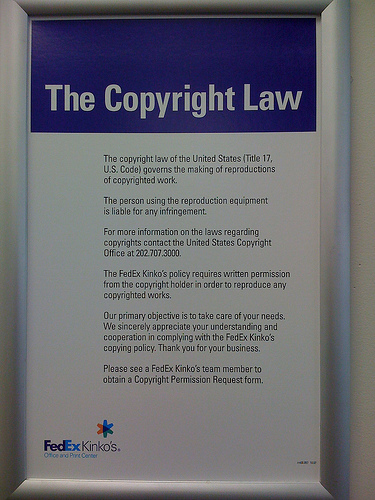Exceptions
| Course dashboard for #OCL4Ed | ||
|---|---|---|
| Copyright: Your educational right to copy | Introduction | Video signpost | History | Working globally | Scope | Ownership | Rights & protections | Exceptions | Transfer of rights | Case study | Case study reflection | E-Activity - Copyright MCQ | |
- Freedom of expression
- Access to knowledge for the benefit of the public
- Private or personal use
Note: The requirements and tests for exceptions vary considerably from country to country.
Contents
Freedom of expression
Freedom of opinion and expression is enshrined in The Universal Declaration of Human Rights and is the cornerstone of modern democracy. The declaration requires the freedom to find and disseminate information in shaping opinion and values in a democratic society.
The right to quote works for purposes of criticism, research and reporting is the only mandatory exception of the Berne Convention and therefore adopted by all signatories of the convention. This permits the verbatim quotation of extracts from copyrighted works on condition that:
- the work has already been published;
- the work is compatible with fair practice, and the extent of the quote does not exceed that justified by the purpose (for example quoting longer extracts of a text than is needed to justify the point, as measured by fair academic practice);
- the source and author (if available) are cited with the quotation.
What constitutes fair practice is not always clearly defined. The determination of the "permissible" length of the quotes which do not exceed the justified purpose may vary according to country. In some countries, this is specified more precisely in the national copyright act.
Access to knowledge for public benefit
Some countries provide specific exceptions for teaching and research in favour of schools, colleges, universities and libraries. Typically these exceptions will permit copying for the purposes of preservation and the replacement of lost or damaged copies. National legislation may provide exceptions for making copies of works for teaching, learning or personal research purposes, for example a photocopy of journal article for personal research or learning purposes. However, you should consult you national legislation for the specific limitations and exceptions in your country.
In most countries protected works may be presented in court and legal proceedings for the purpose of evidence without prior authorisation of the copyright holder. Increasingly, many countries have introduced limitations for individuals with special needs, for example, the right to convert text into Braille for the blind or audio recordings of text for hearing impaired members of society.
Exceptions for private use
Some countries provide exceptions for copying for personal use. In this scenario, the work must already have been made public and there should be no profit-making motive. These exceptions, if permitted by your national legislation, are intended, for instance, to cover home recording of films for personal use. In many instances, there are provisions to compensate the rights' owners, for example levies which are imposed on the sale of reproduction equipment like recording machines or recording media like blank videos. These revenues are administered by collective management bodies.
Copyright licensing schemes and collectives
In many countries, education institutions may collaborate as consortia or with copyright licensing collectives to purchase rights to use copyrighted material under more lenient provisions than provided by the limitations and exceptions of the national copyright legislation. This involves the payment of a licensing fee for certain negotiated rights which is used to compensate the copyright holders for pre-determined copying of their works. This should not be confused with the limitations and exceptions of normal copyright because these additional uses are negotiated contractually in return for the payment of a fee by those participating in the licensing collective.
